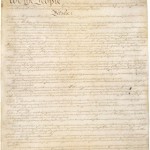Every State of the United States has legal authority regarding people present within its boundaries. A State does not have authority over a person present in another State. For example: If a person is wanted for a crime committed in Illinois is found in Florida, an arrest can only legally be made by Florida law […]
Arrest Warrants Issued in the United States
A judge commanding law enforcement officials to bring a wanted person before the court to answer to criminal charges issues an arrest warrant. The Fourth Amendment[1] to the US Constitution commands that the following conditions exist for an arrest warrant to issue: “The right of the people to be secure in their persons … against […]
Article IV of the US Constitution: Obligations of the States & Federal Government
Articles I, II and III define the legislative, executive and judicial branches of government respectively. The US Constitution’s Article Four defines relationships among the governments regarding the following: recognition of each government’s official acts, how a State treats the citizens of another state, extradition of criminal fugitives, return of slaves, admission of new States, and […]
The United States Felony Process
Americans are being locked up at ever increasing rates. Knowledge of the process leading to this result is important for all citizens. In 2008 the Washington Post reported that more than 1 of every 100 Americans was incarcerated. While there was a slight drop in Americans in jail or prison in 2011, the United States […]









